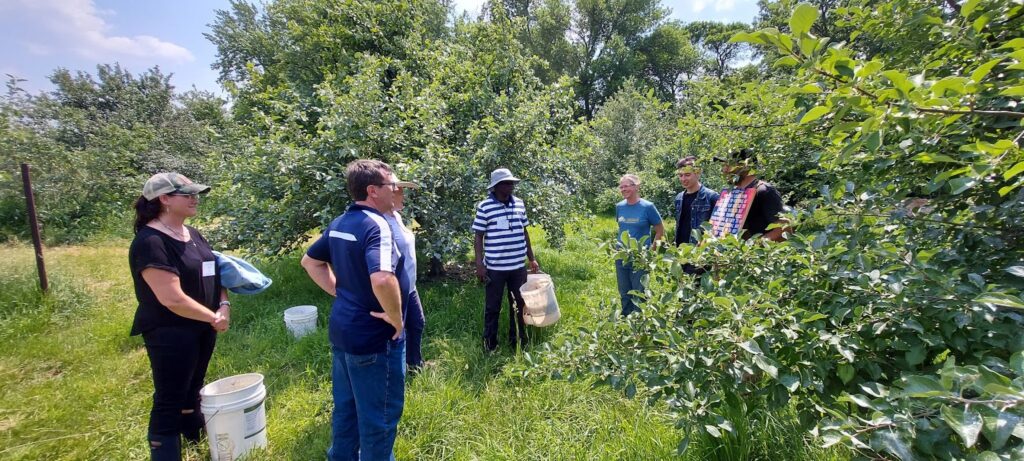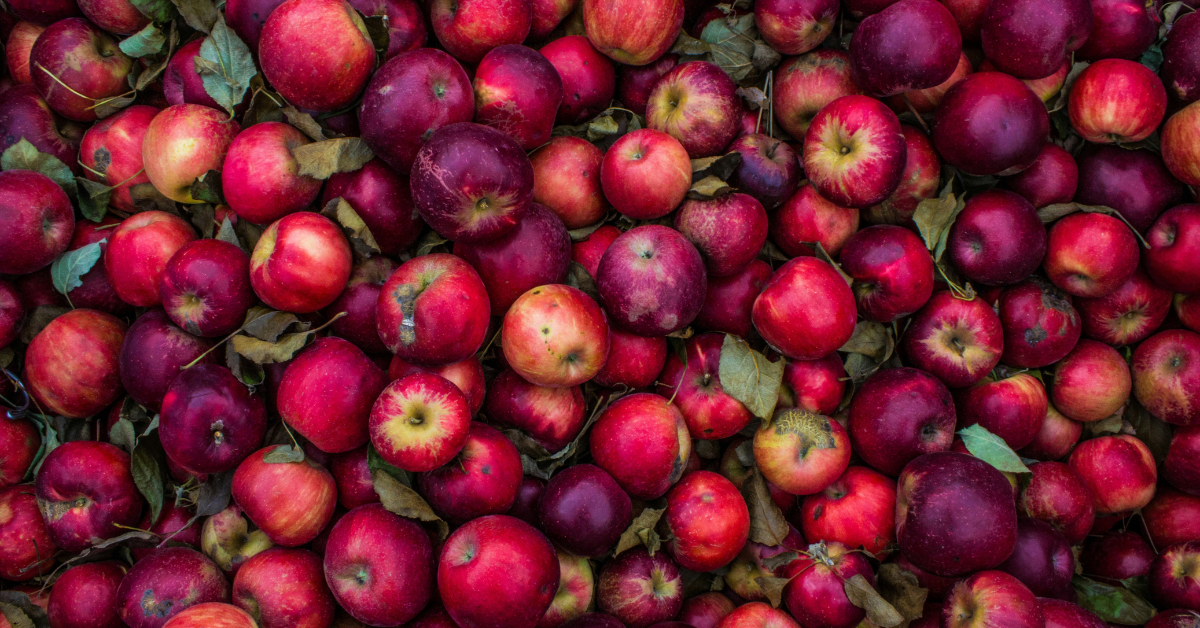15 “I am the true vine, and my Father is the vinegrower. 2 He removes every branch in me that bears no fruit. Every branch that bears fruit he prunes[a] to make it bear more fruit. 3 You have already been cleansed[b] by the word that I have spoken to you. 4 Abide in me as I abide in you. Just as the branch cannot bear fruit by itself unless it abides in the vine, neither can you unless you abide in me. 5 I am the vine; you are the branches. Those who abide in me and I in them bear much fruit, because apart from me you can do nothing.
-John 15:1-5
On an earlier trip to Good Courage Farm, a team of students engaged in the practice of thinning apples so that they do not rub against each other in the wind, create a wound, and open an environment on the apple to be more vulnerable to worms.
It was an example of linking spiritual work with care for the plants on the farm. We read scripture together in the grove. We prayed together. We learned that the apple trees routinely create too many apples per branch. Some fall off naturally but if the apples are too close, you have to thin many of them so that others can thrive.
We were given a biblical text to reflect on while we were thinning little apples. It did not take long to begin thinking about the thinning in other dimensions of our lives or God’s Church that could use some thinning.
Download a free PDF guide to accompany this blog post: “Thinning Apples” is the third of four discussion guides that includes questions and resources for faith leaders, small-group instructors, and individuals.
It has been a recurrent thought for me since that day. Who would have guessed that pruning or thinning apples would be a powerful spiritual reminder that more or faster is not often better. Trying to grow too much fruit can lead to wasting a lot of energy and opportunities. Trying to do too much leaves us discouraged and weary. Our culture sometimes teaches us that acceleration will save everything. The lesson of thinning apples was a reminder that the culture gets some things wrong.
Jesus wants us to remember that it is God who saves us. When we work too hard, we can easily harm ourselves, our families, and our neighbors.

What is an area of your life that comes to mind when you think of places where you need to do some thinning so that your fruitfulness might grow?
Pruning: What is the fruit that will last?
Pastor Kerri Meyer talks about how they use the three evaluative questions in the next paragraph after every liturgy and event. It is a time to notice what might be pruned and where there might be more room for growth. In this section they talk about harvesting and pruning. One of the quotes I love from the video is: “Pruning is the act of looking into the future with hope.” …in our life…in our community…in our world.
What was that like?
What was that like for all of us?
What might we do differently next time?
Try these questions in your ministry.
Faithful Innovation is a process that results in deepened faith because we are invited to notice what God is up to in God’s world and our lives. It invites innovation where we take old and new things and try them together in different ways. We pivot from what we learn in our successes and in our failing to try another new idea, trusting that God’s Spirit can and does lead us.
Pastor Kerri speaks about doing their ministry “not for the sake of the Church, but for the sake of God and creation.” It is easy to fall into “churchification.” It is easy for this tool, God’s Church, to become the center of our spiritual life and in the process hide God’s amazing love, work, and grace behind committee structures, youth groups, small groups, and projects. Faithful Innovation challenges us to re-center Jesus and trust that God’s Spirit is present and guiding us forward.
Our congregations, our ministry strategies, and God’s Church are all good gifts created and called to serve God. They exist to point people toward the One who created, guides, and saves them. We know our Gracious Triune God most clearly through God’s Creating, Jesus’ life, death, resurrection, and teaching … and God’s Spirit who continues to breathe new life into us all. “The early church leaders described the Trinity using the term perichoresis (peri: circle; choresis: dance). The Trinity was an eternal dance of the Father, Son and Spirit sharing mutual love, honor, happiness, joy and respect. God’s act of creation means that God is inviting more and more beings into the eternal.”
God calls the Church into life to be a community of faith that stewards the Good News that God is for us and with us.
If you have not had a chance to see the Rural Ministry case study video please take some time to watch it. If you’ve already watched it, today we want to take you into the video and go deeper into the third part from the subtitle, Pruning and Harvesting at 10.48 to Death and Resurrection – at 15.46. The video was created so that sections might serve your reflection or enhance your ministry. What contexts could you imagine sharing this part of the video?
***
Our culture is biased towards the big. Another theme of the video is the transformative impact of this relatively small farm.
It could be that God will work more in the coming years to renew God’s Church through small communities of faith. God works through places and people who are not big, powerful, or impressive. God’s greatest work was done as God’s resurrecting grace worked after the destructive power of a cross ended Jesus’ life.
Notice in your life and in the lives of others where people are invited to grow deeper. Often, it is in people’s daily work. Other times God works through prayer and reflection in solitude.
Small communities of faith and congregations do amazing things now. In a culture seeking authenticity over association, smaller communities have some great advantages. Or, when a larger congregation learns how to do small gatherings and groups, they may be surprised at what God is up to in those groups’ life.
Not all farming and agriculture happens on large farms. Many people grow food and farm in ways that we rarely notice or name in our talk about rural contexts which often focuses on larger farms or ranches. Part of the mission of this video is to open eyes to see the varieties of agriculture and learn about new/old models of growing food. This week’s Ebook contains more information about the Fresh Expressions movement. The fourth season of the Pivot Podcast also explores this movement in more depth.
Download our Thinning Apples Workbook:
Regenerative Farming: Pruning & Harvesting



